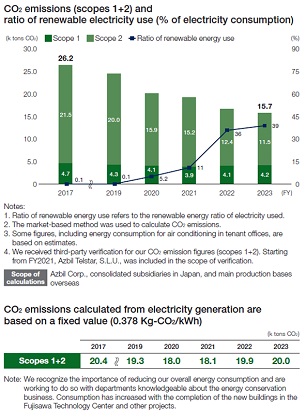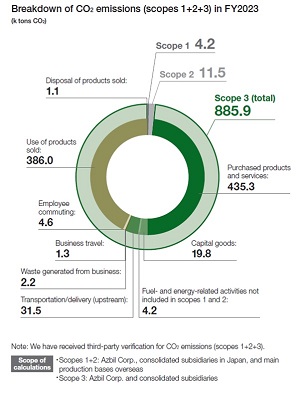Efforts to combat climate change
Decarbonization Initiatives
Global warming is a worldwide challenge. Members of the azbil Group are working together proactively to take measures to save electricity and conserve energy in their business activities, while bearing in mind the importance of their role in helping customers and society to significantly reduce CO2 emissions.
Also, the azbil Group also supports policies based on various agreements to take measures to prevent global warming, including the Paris Agreement.
We support the Japanese government’s course change toward carbon neutrality, and we comply with the Act on Rationalizing Energy Use and the Act on Promotion of Global Warming Countermeasures, which are national laws on climate change. In accordance with these laws, we report to the government once a year on our energy consumption, our progress on energy conservation targets, our energy reduction plans, and the amount of our greenhouse gas emissions.
Regarding our initiatives for decarbonization as a company, based on our 2050 Long-Term Vision for Reducing Greenhouse Gas Emissions we have formulated policies and plans and are working to implement them. Under the direction of the executive officer for azbil Group Environmental Load Innovation, we have appointed officers in charge of each large-scale business site and are working together with management. In the environmental management system, which is centered on the azbil Group Environmental Committee and cuts across business divisions and major regional overseas production sites, we have set a common GHG reduction target which is an SBT-certified 1.5 °C target. To meet this goal and check progress, we share specific targets for energy reduction and utilization of renewable energy and hold regular meetings as appropriate. Additionally, there are regular meetings between the Environment Promotion Department, which is a coordinating department, and the person in charge of environment at each Group company to follow up on progress. In addition, Azbil Corporation holds an Environmental Managers' Meeting six times a year as an energy management organization. It is headed by an Azbil executive officer and includes the director of each business site. There, we create CO2 reduction targets and achievement plans, check progress, and provide feedback to the workplace to promote proactive efforts.
At our main locations we have introduced our own energy management solution, ENEOPT™, to visualize power usage and other factors. We are working to effectively optimize the use of electricity and other energy in production and office environments.
We utilize the knowledge gained through these efforts to contribute to the reduction of GHG emissions from our customers and society.
Decarbonization transition plan
In response to the societal shift toward decarbonization, we are actively contributing to solutions for the energy challenges faced by both our customers and society at large. In addition, we have developed a transition plan to support decarbonization efforts.
In December 2023, we submitted an application to the SBTi to revise our scope 3 emission reduction target upward from a 20% reduction to a 33% reduction and to set a net-zero target for all CO2 emissions (scopes 1, 2, and 3).


Greenhouse Gas Emission Reduction Targets for 2030
The azbil Group established its “2050 Long-Term Vision for Reducing Greenhouse Gas Emissions” in which it aims for substantially zero GHG*1 emissions (scopes*2 1 + 2) by 2050 from business activities and to achieve carbon neutrality. To achieve our 2050 long-term vision for reducing GHG emissions, we have set 2030 GHG reduction targets for our business activities and entire supply chain, and we have begun work on specific measures.
Seeing the rapidly building momentum to create a decarbonized society, the azbil Group revised its target of reducing GHG emissions through business activities from the previous 30% (from a 2013 base year) to 55% (from a 2017 base year). The new target was again approved by the Science Based Targets initiative*3 as meeting the requirement for achieving the organization’s goal of keeping global temperature increase below 1.5 degrees Celsius compared with pre-industrial levels. The azbil Group’s targets for reducing GHG emissions by 2030 was recognized as meeting the requirements of the international community and align with the Paris Agreement, thus allowing the Group to further accelerate efforts to achieve carbon neutrality. To accomplish its goal, the azbil Group will strengthen efforts in testing and applying energy-saving technology cultivated at the various business segments as well as proactively use renewable energy.
- Reduce GHG emissions from business activity (scopes 1+2) by 55% compared to 2017 [Recertified in August 2021]
- Reduce GHG emissions from the entire supply chain (scope 3)*2 by 20% compared to 2017 [Certified in May 2019]
*1. A general term for gases in the atmosphere that cause a “greenhouse effect” by absorbing part of the infrared radiation emitted from the earth’s surface
*2. Greenhouse gas scopes are as follows.
Scope 1: direct GHG emissions from a business (from burning fuel and industrial processes)
Scope 2: indirect GHG emissions from the use of electricity, heat, or steam provided by another business
Scope 3: indirect GHG emissions related to business activities (emissions not included in Scopes 1 and 2)
*3. The SBTi is a collaboration between the CDP, World Resources Institute, World Wide Fund for Nature, and United Nations Global Compact, and helps corporations achieve science-based targets (SBT) for reducing GHG emissions that keep global temperature increase below 1.5 degrees Celsius compared with pre-industrial levels (their previous aim was to keep the increase well below 2 degrees Celsius). As of August 2021, about 120 corporations in Japan have been approved by the SBTi, with that number increasing at an accelerating rate compared with the rest of the world.
*4. In June 2023, we sent a commitment letter to the SBTi to set a net-zero target for all CO2 emissions (scopes 1,2, and 3) by 2050 within two years, and then submitted our application in December 2023.
The targets approved by the SBTi are as follows:
Azbil Corporation commits to reach net-zero GHG emissions across the value chain by FY2049.
Azbil Corporation commits to reduce absolute scope 1 and 2 GHG emissions by 55% by FY2030 from the FY2017 base year. Azbil Corporation also commits to reduce absolute scope 3 GHG emissions by 33% within the same time frame.
Azbil Corporation commits to reduce absolute scope 1, 2, and 3 GHG emissions by 90% by FY2049 from the FY2017 base year.
Participation in External Organizations
We actively participate in industry groups and initiatives aligned with the azbil Group’s thinking and direction to promote carbon neutrality. When reviewing participation in external organizations, we regularly examine whether there is a significant contradiction with our thinking and direction, and if there is a large deviation, we consider withdrawing. These efforts are examined from the viewpoint of corporate planning, environment promotion, and sustainability promotion, and are deliberated and decided in the Management Meeting when a judgment is required.
Azbil Corporation participates in the Japan Climate Initiative*1 and supports it in “Joining the front line of the global push for decarbonization from Japan.” The azbil Group actively promotes initiatives to combat climate change.
The Japan Climate Initiative encourages the Japanese government, industry groups, and companies to proactively reduce CO2 toward the realization of a carbon-neutral society as required by the Paris Agreement, and encourages participating companies themselves to take active steps toward reducing carbon emissions.
Regarding our participation in the Japan Climate Initiative, we share information with our chief risk officer (CRO) with the approval of the aG director in charge of environmental protection innovation, and also report to the Management Meeting.
Since various policy proposals have been made through the Japan Climate Initiative, the azbil Group engages in dialog with policy makers through its participation in the initiative.
In addition, Azbil Corporation announced its participation in the Japan Business Federation (Keidanren) Challenge Zero proposal aimed at promoting innovation that will contribute to achieve a decarbonized society.*2
*1. Japan Climate Initiative (JCI) is a network committed to strengthening communication and exchange of strategies and solutions among all actors that are implementing climate actions in Japan.
(Japan Climate Initiative(JCI):https://japanclimate.org/english/)
*2. Visit Keidanren’s Challenge Zero website for two examples of our efforts, our virtual power plant (VPP) business, which integrates and controls various energy resources using our automatic demand response system, and our effort to reduce global CO2 emissions through the development and spread of our RENKEI control technology.
(challenge-zero web site:https://www.challenge-zero.jp/en/)
External evaluations
Our various climate change initiatives were given an A evaluation in the CDP Climate Change*1 2023 report.

Answers to CDP Climate Change 2023 Questionnaire(Japanese)
Answers to CDP Climate Change 2022 Questionnaire(Japanese)
Answers to CDP Climate Change 2021 Questionnaire(Japanese)
*1. A program to disclose corporate climate change risk, created by the international nonprofit organization CDP. It investigates the status of climate change initiatives carried out by participating corporations every year and officially publishes the aggregated results. It also gives each corporation an individual rating for the status of its initiatives in an eight-step evaluation with A as the highest rating.
Results for the Fiscal Year 2023
CO2 Emissions from the Group’s Business Activities (Scopes 1+2)
In FY2023, the results were much better than planned. The azbil Group emitted 16 thousand metric tons of CO2 from its business activities at its own sites (scopes 1+2), a 40% reduction from FY2017. We are on track to achieve our 2030 SDG goals.
To reduce CO2 emissions from our business activities, we have begun using 100% renewable energy sources, including off-site corporate solar power purchase agreement (PPA) services, for the electricity used at the Fujisawa Technology Center. The procurement of renewable energy sources through these PPA services represents renewable energy procurement with additionality. The amount of electricity used at the Fujisawa Technology Center, which has begun procurement, is equivalent to 24% of the azbil Group’s total electricity consumption (actual results for FY2023). The ratio of renewable energy sources to the total electricity consumption of the group is estimated to be 63% for FY2024.
CO2 Emissions Throughout the Supply Chain (Scope 3)
The azbil Group's entire supply chain (scope 3) emitted 886 thousand tons of CO2, a 20% reduction from FY2017. We are on track to achieve our 2030 SDG goals.
To reduce CO2 emissions across the supply chain, we are promoting sustainable design, such as resource- and energy-saving design, and cooperating with business partners to reduce CO2 emissions from the use of products sold, and products and services purchased, which account for 90% of total emissions.

Greenhouse Gas Emissions Verification Statement
(Click here for more detail)
CO2 Emissions (Scope 1+2) produced by azbil Group bases
(Metric tons of CO2)
|
|
FY2020 | FY2021 | FY2022 | FY2023 |
|---|---|---|---|---|
| Scope1 + 2 | 20,019 | 19,066 | 16,552 | 15,734 |
| Scope1 | 4,093 | 3,880 | 4,102 | 4,246 |
| Scope2 | 15,926 | 15,186 | 12,449 | 11,488 |
| Scope3 | 705,934 | 847,591 | 1,020,188 | 885,902 |
Scope: Azbil Corp., consolidated subsidiaries in Japan, and main manufacturing bases overseas
(equivalent to 90 % of the entire azbil Group, based on CO2 emissions in FY 2019)
Past initiatives
Reducing Society’s Impact on the Environment
We strive not only to reduce the CO2 emissions from our own business activities, but also to provide products and solutions that help our customers to reduce their burden on the environment.
For details, see “Realizing Our Desire to Reduce Environmental Impact Through Our Core Businesses”
- Overall of Environmental Initiatives
- Contributing to the environment through our core businesses
- Reducing the environmental impact of our own business activities


